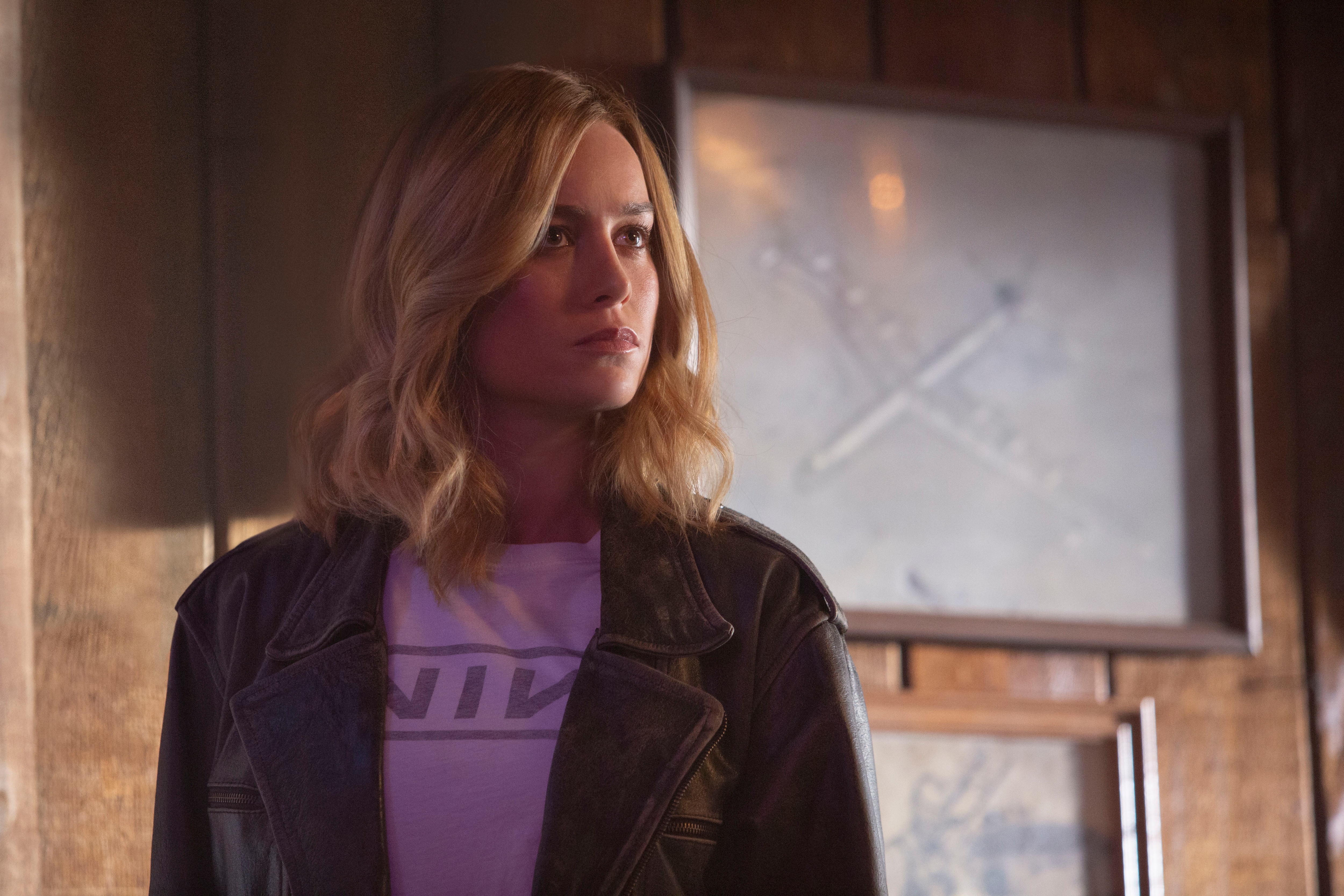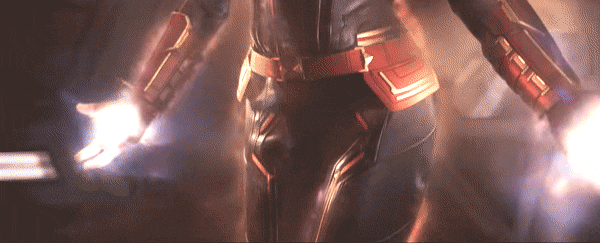Create a free profile to get unlimited access to exclusive videos, sweepstakes, and more!
Captain Marvel, queerness, and the search for identity

When I first saw Captain Marvel, there was so much that I identified with. Her rage, her frustration, her stubbornness, her perseverance, but what resonated most deeply was her struggle with her identity, as manifested through her name’s evolution throughout the film. Being nonbinary means renegotiating my relationship to my name — something Carol Danvers understands all too well in the film.
Danvers struggles first to discover her identity and then to claim it. She starts as the amnesiac Vers, completely unaware of her life before living among the Kree. After returning to earth to find everything she knew to be true was actually a carefully constructed fiction — even her memories had been altered — our hero finds herself reeling. If she is not Vers, then who is she?
Maria Rambeau knows exactly who she is. She remembers her friend who believed in her as a mother, as a pilot, and as a person. (Probably also as a lover.) She remembers Carol Danvers.
It’s a powerful moment that elicited tears from more than just myself when I saw the film in theaters. Rambeau and Danvers have off-the-charts chemistry — and both Lashana Lynch and Brie Larson, respectively, deliver taut, compelling performances. The moment also serves as a reminder of the power of a name.
My father named me after the mountains near where I was born. He wanted me to have the strength of the range that juts up from the Pacific Ocean, reaching heights of over 14,000 feet. Throughout my life, my given name has been a touchpoint for me — outside of a three-year period when I wanted to be named Rocky, which I can’t explain either.
But lately I’ve started to wonder: Am I S-----? Is the name I once clutched as if I could draw the strength from the very mountains I’m named for really mine anymore?
In some ways, the answer is: yes, of course. Of course, I am still the person my father named S-----. Of course, I am still the person who came from all those years of being called S-----, of being known by S----, of not just accepting, but also choosing that name.
And in others, S----- is the person who came before. Before I learned to love myself, before I came out (twice), before I accepted my fatness, and before I embraced my gender identity. In the same way that Vers is a part of Danvers, but only that one part, S----- remains with me, inside of me, but is also no longer quite accurate.
I was in 10th grade when I chose the name S.E. At the time, I thought of it as my nom de plume for when I was a writer. What began as a simple exercise in imagining my future opened a crack inside me, a tiny fissure that allowed my gender identity to squeeze out just a little. I wouldn’t want to be gendered as an author, I decided. I would want to be understood for what I had to say. (LOL. My gender identity was going to get out no matter what story I had to tell myself to make it happen.)
Little did I realize that that was the moment I started something monumental. Little did I realize that the ease I felt with S.E. wasn’t just about the ease of best-laid plans, but the gentle sigh of recognition.
Transgender and nonbinary folks describe finding our names in lots of ways. For some, it feels like home, for others it’s an alias they used online — even others work with their partners to find the name that best suits them. And the truth is that just as our relationship to our true names (and, consequently, genders) varies, so does our relationship to earlier names we’ve been called.
Some people view their given name as their deadname, others their birth or former name; even others keep their given name, and others, like me, find ways to adapt it, to make it fit an evolving self. I am not suggesting that deadnaming is in any way unserious, but rather, I am saying trans and nonbinary folks’ relationship to our prior names is as varied as our community is. The reality is that deadnaming does great harm to many transgender and nonbinary people — particularly youth. (Never, ever deadname someone. If you don’t know what to call someone who has transitioned, ask them for their name and pronoun.)
I’ve realized that just because S.E. feels like home doesn’t mean that S----- is no longer me. It’s complicated, as if my name and identity are a series of Russian nesting dolls. Inside S.E. is S----- and inside S----- is Red (my childhood nickname), and so on and such forth. Listen, folks, I’m not sure where the dolls end either, but I don’t have to know. My relationship with my names is as fluid as my relationship with my gender.
When Danvers is forced to face the powerful amalgamation of the smartest minds of the Kree, the Supreme Intelligence tosses Danvers around as a wolf does a rabbit. The Supreme Intelligence scolds her, telling her that she is Vers, that she is Kree, that she must do as she is told or they will take her powers away. As she has throughout her life, Danvers faces the challenge head-on and screams, “My name is Carol Danvers.” As she does so, she rips the chip that is limiting her powers from her neck and starts kicking some serious Kree ass.
Danvers can only remove the chip once she understands the implications of the lies she’s been told. She is not limited. Her emotions are not dangerous. She is not what they made her. She’s Carol mother-effing Danvers.
At first, the parallels to my own experience and that of other transgender and nonbinary folks may not seem to match up, but you’re forgetting something important, my friends: Vers is not the only other moniker Carol Danvers goes by.
It seems that at least in the film, Captain Marvel is the name Danvers has chosen for herself. Though that name is never heard in the narrative of the film, it is clear that this is who she has become—and unlike the comic books, it’s not a recycled name from another hero. It’s not the name her parents gave her. It’s not the name the Von-Rogg and the Kree gave her. It’s not the name printed on her destroyed nametags. It’s not the name Rambeau gives her, nor what her niece calls her. It is, however, a name she ostensibly requests to be called by the Avengers — and also the title of the film, so, yeah, it’s safe to say it’s an important aspect of who she is.
Can she be both Carol Danvers and Captain Marvel? Can she reject the notion that she must choose?
Yes.
And so can I.
The layers of my name and my identity are all true and yet they’re all still evolving. Will I always be comfortable with friends and family calling me S-----? I don’t know. Right now, I don’t have to choose, though. I can be comfortable with one name in one context or both names in some contexts, or I can completely change my mind and choose an entirely new name in a year or 20. That’s my prerogative and the prerogative of every transgender and nonbinary person who chooses to create themselves through naming. (Before you ask, consider yourself advised that unless you are given permission to call me otherwise, S.E. will do just fine.)
I don’t want to either be who I was or who I am. I want to be on a continuum connecting who I once was, who I am, and who I am becoming. I want to be all of who I am and embrace everything that comes with that. I want to be S----- and S.E. and yes, even Red. What better way to destroy a binary than refusing to choose?
A name is at once superficial and devastatingly important. Names aren’t just what we’re called; they become part of who we are. And, for transgender and nonbinary folks, our names and our right to be recognized by them both legally and socially are an ongoing battle. Even if we view deadnames as former names or given names, even if we use nonbinary pronouns, even if we never change our names, our decisions are valid — and we deserve to be called by the names we choose, regardless of whether or how many times that may change.
The views and opinions expressed in this article are the author's, and do not necessarily reflect those of SYFY WIRE, SYFY, or NBC Universal.



























